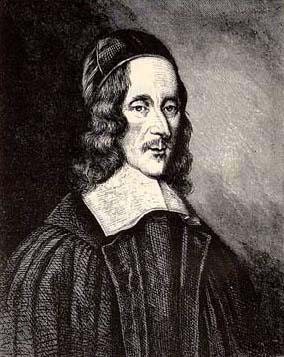The hymn Let All the World in Every Corner Sing was written by Herbert George. This hymn is a “big sing” – set to the tune “Luckington”, each verse takes a lot of puff!
Possibly the hymn is inspired by Psalm 66:4 – “All the earth worships you; they sing praises to you, sing praises to your name.”
E.g. Congregation sings opening and closing couplets of each verse (“Let all the world in every corner sing: / my God and King!”) and choir sings intervening four lines, allowing the congregation to listen and reflect on Herbert’s words.
E.g. All sing opening and closing couplets of each verse, and then the middle four lines are divided between two groups in the congregation:
Group 1 – “The heavens are not too high, / his praise may thither fly”
Group 2 – “the earth is not too low; his praises there may grow”.
This division of the lines (perhaps between women and men) emphasises the contrasts that George Herbert is describing.

Herbert George, M.A., the fifth son of Richard Herbert and Magdalen, the daughter of Sir Richard Newport, was born at his father’s seat, Montgomery Castle, April 3, 1593. He was educated at Westminster School, and at Trinity College, Cambridge, graduating B.A. in 1611. On March 15, 1615, he became Major Fellow of the College, M.A. the same year, and in 1619 Orator for the University. Favoured by James I., intimate with Lord Bacon, Bishop Andrewes, and other men of influence, and encouraged in other ways, his hopes of Court preferment were somewhat bright until they were dispelled by the deaths of the Duke of Richmond, the Marquis of Hamilton, and then of King James himself. Retiring into Kent, he formed the resolution of taking Holy Orders. He was appointed by the Bishop of Lincoln to the Prebend of Lcighton Ecclesia and to the living of Leighton Bromswold, Hunts, July 15, 1626. He remained until 1629, when an attack of ague obliged him to move to his brother’s, house at Woodford, Essex. Not improving in health at Woodford, he moved to Dantsey, in Wiltshire, and then as Rector to Bemerton, to which he was inducted, April 26, 1630, where he died Feb. 1632. The entry in the register of Bemerton is “Mr. George Herbert, Esq., Parson of Foughleston and Bemerton, was buried 3 day of March 1632.”
The life and literary work of the English poet George Herbert (1593-1633) was contemporaneous with William Shakespeare (1564-1616) and John Milton (1608-1674). “Let all the world in every corner sing” is from The Temple, and it appeared in the section “Christian Life” under the title “Antiphon (I).” The Temple was a very popular work, published in thirteen editions between 1633 and 1679, a total of more 20,000 copies – an amazing publication run in the mid-seventeenth century!
The title “Antiphon” is a distinct form. One definition states that it is “ a short sentence sung or recited before or after a psalm or canticle.” In this case, however, hymnologist Richard Watson proposes a more literary definition from the Oxford English Dictionary: “a composition in verse or prose, consisting of verses or passages sung alternately by two choirs in worship.” The original layout of the poem presented above better fits this definition.
It is said that Herbert, on his deathbed at age 39, gave this
collection of religious poems to a friend to take to Nicholas Ferrar, a
member of the Anglican community at Little Gidding, with the following
inscription:
“Tell him, he shall find in it a picture of the many spiritual Conflicts that have past betwixt God and my soul, before I could subject mine to the will of Jesus my Master, in whose service I have now found perfect freedom; desire him to read it: and then, if he can think it may turn to the advantage of any dejected poor Soul, let it be made publick: if not, let him burn it: for I and it, are less than the least of God’s mercies.”
Professor Watson, a scholar of English literature, notes a characteristic of Herbert’s poetry: “. . . his emphasis on the heart: although the Church sings (or “shouts”) psalms, it is the heart which must ‘bear the longest past,’ continue the praise even longer that the Church does.”
King James I (1566-1625), who initiated the translation of the Bible popularly known as the “King James Version,” respected Herbert and considered appointing him an ambassador. The King died before these hopes were fulfilled, so Herbert pursued his original career plans. Herbert was ordained in 1626. Next he was appointed vicar, then rector, of the parish of Bemerton and Fugglestone.
Herbert was strongly influenced by fellow metaphysical poet, John Donne (1572-1631), a friend of the family. Their poetry was compared more recently by T. S. Eliot (1888-1965), who found, in general, that Donne was more the “orator,” while Herbert’s poetry was more intimate. This is perhaps evident in another Herbert text in The United Methodist Hymnal, “Come, My Way, My Truth, My Life” (The UM Hymnal, 164). The worldwide vision expressed in “Let All the World” coincides with the expansion of the British Empire at the beginning of the seventeenth century and the chartering of the British East India Company (1601).
What are we to make of the lofty and dominant monarchial language – “God and King” – in the twenty-first century? We cannot (or should not) rewrite history. On the one hand, this language bears little connection to the American experience and psyche. On the other hand, this hymn bears witness to a part of the history of the Christian church. It is unlikely that we will suspend the singing of the “Hallelujah Chorus” from Messiah (1714) by George Frideric Handel (1685-1759). The repeated “King of kings and Lord of lords” (from Revelation 19:16) is unlikely to be modified by any church musician for fear of significant reprisals. While not the preferred characterization for God by many in this century, Herbert’s reference is one of a wide range of ways to address the Deity … and it would be regrettable to throw the proverbial baby out with the bath in such a magnificent devotional expression.
The famous English composer, Ralph Vaughan Williams (1872-1958) helped to bring “Let All the World in Every Corner Sing” back to public awareness when he included it as the final movement of his Five Mystical Songs (1911) – all poems by George Herbert. First published in the 1935 Methodist hymnal, the tune All the World was yoked to this text by hymnal editor, Robert G. McCutchan – a pairing that continued in the 1957 and 1966 Methodist hymnals.
Then, in 1960, hymnologist Erik Routley (1917-1982) set this text to its present tune, AUGUSTINE. The tune is named for the Edinburgh parish, Augustine-Bristo Congregational Church, where Routley served as minister from 1959 to 1967, and it was first published in Hymns for Church and School (1964). Routley said, “The present tune happens to be the only one in circulation which preserves the original form of the text [antiphon, stanza, antiphon, stanza, antiphon].”
Following the age-old form of the antiphon, this setting sits in great contrast to the many strophic (hymns written in poetic stanzas) hymns found in the United Methodist tradition. Routley’s setting of Herbert’s text exemplifies the majesty of the text. Between each robust proclamation of the singing of God’s people to their “God and King,” Herbert writes of the vastness of God’s creation and the greatness of God’s power.
This text is aptly placed toward the beginning of our hymnal among hymns of praise and thanksgiving to God. Its triumphant message calls the world to sing praise to our God and King. “The church with psalms must shout, no door can keep them out.”
In this hurting, broken world, the church cannot stop proclaiming the good news. People need to hear about Christ and the Christian life. People all over the world, as well as those in our own neighborhoods, are yearning for hope and healing. It is the message of reconciliation, grace, hope, and Resurrection that we have to offer them. People all over the world need to hear the gospel message. May all the world “in every corner sing”!
REFERENCES

